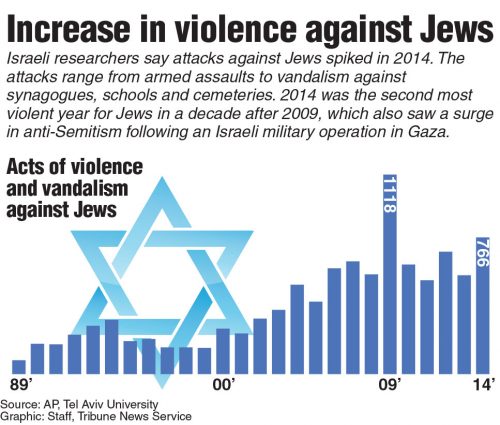Stuart Wright, a 31-year-old Chicago was charged with a hate crime and is being held on a $150,000 bail for drawing swastikas on a synagogue in the Loop Feb. 4. According to DNAinfo, Chicago police said the man is “a white supremacist who has a swastika tattoo on his back.”
This crime, while terrible, is among the many anti-Semitic hate crimes that have occurred across the United States in 2017. The lack of collective knowledge on such crimes may shock some people, but is not news to the Jewish community.
“There’s a push for media to be specifically reporting on certain types of crimes done by certain types of people,” Matthew Charnay, DePaul’s Jewish Life Coordinator, said. “They want to show how people of color and, specifically Muslim people, are hurting white Christians. They don’t care as much about Jews.”
“The other thing here, is because it’s so common,” Charnay said. “It’s not interesting to people anymore because synagogue windows get smashed all the time, for example.”
DePaul University has also faced hate crimes target Jews campus, most recently when an anti-Semitic fliers were printed from multiple printers on the Lincoln Park Campus in March 2016.
“It’s not news if it happens all the time,” Charnay said. “If everyone was drowning every day, they wouldn’t report all of the drownings.”
“For a long time, people believed that anti-Semitism was dead just like the Nazi Party,” Danielle Harris, a Jewish DePaul student said. “I think because Americans do not truly recognize anti-Semitism, it is not heavily covered by the media.”
Sam Smiley, a DePaul student raised in a multi-religious home but identifies as culturally Jewish, agrees.

“It’s plain and simple, people think that Jews aren’t really marginalized in the same way they used to be,” Smiley said. “The Holocaust is over now, but it’s not really over in the same way. There is systematic racism even though slavery is over.
“I remember being in middle school and having Jew jokes made and people don’t think it’s offensive,” Smiley said. “It’s not as common for people to stand up about it, people back down when it comes to religion.”
This lack of media attention brings attention to the current political climate.
“I really think it has to do with the hatred and bigotry that came with Trump’s hatred towards marginalized groups,” Smiley said. “Because Trump is the president he’s normalizing the hatred and I think it has increased recently because of that.”
“With all of the hatred stemming from Trump’s presidency and policies, people who commit hate crimes are getting justification for their actions,” Harris said.
Jews have been marginalized across history, starting even before Christianity was an established religion. There was also political, social, and economic anti-Semitism during the Enlightenment, and, of course, the immense hatred found in the Holocaust. This anti-Semitic attitude continues today in some areas.
“There’s never been more than 20 million Jews ever in existence at one time throughout history,” Charnay said. “The idea that it’s such a small community but it always seems to be stable makes a lot of people upset.
“People don’t like things that are different, it scares them,” Charnay continued. “The tight-knit idea of the Jewish community is something that targets them.”
All three agree on one thing: the average person can stand up and make a difference.
“I think confronting passive anti-Semitism, passive Islamophobia, passive gay bashing, that’s what’s actually going to change something,” Charnay said. “Stop minor hate. It takes years to manifest itself. You have to plant the seed of hate, you have to water the seed of hate, and it has to grow. It doesn’t just happen one day. It evolves over time and if someone can stop the water of that seed, it’ll die.”
“If you see something say something,” Harris said. “Don’t brush off sly remarks made or glance away when someone insinuates violence; confront them.”
“If someone says something offensive, it doesn’t even have to be about Judaism, but being aware that that’s not okay and being comfortable standing up and saying that’s not okay,” Smiley said.
“The biggest thing people can do is go to a Jewish Life event and not be ignorant,” Smiley said. “If you learn about what everything is about and you’re tolerant, then coexisting and respecting everyone else becomes a lot easier.”
The DePaul Jewish Life Center offers events throughout the school year that are open to everyone, and can offer a chance to learn about another culture.
As more awareness is drawn towards the lack of media attention the Jewish community receives, many question if the hate crimes will continue.
“These hate crimes will definitely continue as things become more and more volatile in the U.S.,” Harris said. “I think it is going to get worse before it gets better, unfortunately.”
Smiley agreed that anti-Semitic hate crimes will likely escalate.
“I like to think everyone in the world is good and not going to attack marginalized groups, but I do think they are on the rise and I don’t think it’s going to stop if we continue to support and tolerate negative opinions,” Smiley said.
Charney said that honest reporting, not increased coverage, would be most beneficial.
“There’s waves of it being reported more and being reported less depending on who and when and where and why,” Charney said. “I don’t want there to be more coverage about anti-Semitic crimes. I just want it be fairly reported and accurately reported.”
